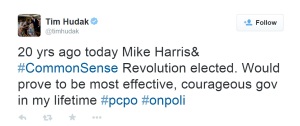By Joe Fantauzzi
ninetytwopointeight@gmail.com
"Revenue tools."
Those two words seem to be the rallying cry in an attempt to spur transit expansion in a talk-weary Toronto desperate for respite from crowding into subway cars, squeezing onto streetcars and waiting in the cold for another bus after being left behind by the last, packed to capacity.
Metrolinx, the provincial transit authority, has announced $50 million worth of lines on maps called The Big Move. 'Lines on maps' in the sense that the costs of the plan cannot be covered at present.
 And yesterday, Toronto's business community threw down the gauntlet.
And yesterday, Toronto's business community threw down the gauntlet.
During the release of a discussion paper, the Toronto Region Board of Trade estimated the annual economic cost of gridlock at $6 billion. If we fail to invest in adequate transit expansion that number will rise to $15 billion by 2031, the board said.
A call for action during dire times, it would seem.
The problem is, all of the Board's suggestions would hit low-income Torontonians harder because they serve as flat taxes, meaning everyone pays the same ─ unlike income tax, which rises based on the ability to pay.
In a post today Spacing noted that the only office-holding politician at the Board's policy announcement was Trinity-Spadina's MP Olivia Chow, who serves as the federal New Democratic Party's transportation and infrastructure critic, and who has also been publicly musing about running for mayor in 2014. (Full disclosure: I want Chow to run for mayor and am actively encouraging her to do so. She has not publicly declared her intentions.)
Political argle bargle aside, many people likely can't convince themselves in good conscience that, as desperate as they are for more transit, it's fair that the poorest Torontonians should have to contribute at the same rate as the richest Torontonians just for the privilege of commuting to work.
It's just not how a society that acknowledges, and wants to curtail inequality, operates.
Surely, we don't want to go down the path of ends (more transit) justifying the means (disproportionately taxing those who are already struggling). Do we?
No. This is Canada.
It stands to reason then, that we should be asking the wealthiest Torontonians to pay a little more ─ which is something the Board of Trade didn't do yesterday.
The February 12 issue of Canadian Business magazine revealed the amount of so-called "dead money", or money Canadian businesses are not reinvesting into the economy after years of tax cuts, at an estimated $600 billion.
$600 billion. Of idle money.
If we're going to create new taxes, we might as well add one for companies that get giant tax breaks and do nothing with the money.
Tax that idle cash and invest it into transit. If businesses want an economy free of gridlock, they'll have to pay for it, too.
As a side note, the Canadian Business article identified what the magazine called the "Top 25 Corporate Hoarders" in Canada. The Bank of Nova Scotia was first at $54.8 billion. The Royal Bank of Canada was third at $12.6 billion.
Meanwhile, as an unrelated interesting fact, representatives of both Scotiabank and RBC sit on the Toronto Region Board of Trade's board of directors.
Admittedly, the revenue tools are out there. The tools we choose will define us.







